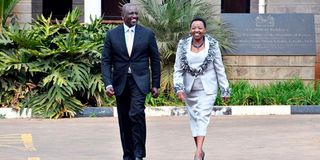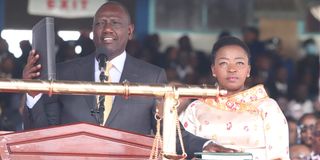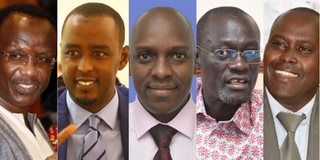
President William Ruto.
| PCSPolitics
Premium
Revealed: Meet President William Ruto's inner circle
What you need to know:
- Ruto has moved to tighten his inner sanctum as he settles down to implement his development agenda.
- Ruto has constricted his closely-knit team of technocrats, key aides, business entrepreneurs, politicians, security chiefs and even close family members to help shape his agenda.
- President Ruto’s younger brother David Ruto has also been tapped into the team.
President William Ruto has moved to tighten his inner sanctum more than a year into office, as he settles down to implement his development agenda for the country.
The Head of State has constricted his closely-knit team of technocrats, key aides, business entrepreneurs, politicians, security chiefs and even close family members to help shape his agenda for the success of his administration.
According to insiders in government, the president highly regards his Council of Economic Advisors which he is banking on to turn around the economy which has been battered and adversely affected by the high cost of living.
The Nation has established that the naming of former Cabinet Minister Adan Mohamed as the Chief of Strategy Execution at the council elevates him to a higher role and ultimately brings him onto the table of key allies to the president that he is relying on to shape his legacy.
Also Read: From Kibaki loyalist to Uhuru’s blue-eyed boy, meet Ruto’s right-hand man Katoo Ole Metito
President Ruto’s younger brother David Ruto has also been tapped into the team.
Mr Ruto holds a bachelor’s degree in business and management information systems and a master's in business administration.
He is also a certified project management professional with skills in Information Technology (IT) strategy, software implementation and enterprise resource planning.
He has maintained a low profile since last year’s election, having crisscrossed “politically volatile” areas to drum up support for his elder brother.
Also Read: Kalonzo - We now recognise Ruto as president
Other individuals who wield immense power in President Ruto’s administration include; State House Comptroller Katoo Ole Metito, Chief of Staff and Head of Public Service Felix Koskei, the president’s private secretary Reuben Maiyo and Interior Principal Secretary Raymond Omollo and his Cabinet Secretary Kithure Kindiki.
Also, in the list is Chief of the Defense Forces General Francis Ogolla, Defense advisor Monica Juma, Director General of the National Intelligence Service (NIS) Noordin Haji, and Faruk Kibet, a long-time confidant of the president from the time he was an MP for Eldoret North Constituency.
President Ruto’s deputy Rigathi Gachagua, Prime Cabinet Secretary Musalia Mudavadi, Roads Cabinet Secretary Kipchumba Murkomen, Secretary to the cabinet Mercy Wanjau and Mary Wambui who is the Chairperson of the Board of Directors of the Communications Authority of Kenya (CA), as well as the president’s spouse Rachel Ruto are also regarded as his close confidants.

President William Ruto declared his support for France while First Lady Rachel Ruto was on Argentina side in the World Cup Finals.
A private secretary to the President (Maiyo), State House Comptroller (Ole Metito), Head of Public Service (Koskei) tend to become powerful in every regime “as they are the eyes and ears of the president.”
Dr Omollo, Prof Kindiki and Mr Haji are key in internal security advisory while General Ogolla, the head of the country’s military and Ms Juma have been tapped as the key Defense advisers.
Mr Haji and Mr Murkomen were key in brokering the ceasefire deal between president Ruto and Azimio leader Raila Odinga leading to dialogue which stopped weeks of violent anti-State protests.
The duo was among key president’s allies who met with Mr Odinga alongside President Ruto in the presence of former Nigeria president Olusegun Obasanjo in Mombasa days before the dialogue team for established.
After being accused of being among state operatives who were allegedly plotting to overturn president Ruto’s victory, General Ogolla has become a key ally and close confidant of the Head of State and even hosted him at a private meeting in his Alego Ng’iya home, Siaya county during his Nyanza tour in October alongside other government officials including DP Gachagua.
Mr Mudavadi is said to be a key cog in president Ruto’s foreign policy, leading to his appointment as Foreign and Diaspora Affairs Cabinet Secretary.
Also Read: Head of Public Service Felix Koskei orders Athi, Rift Valley water agencies to suspend their CEOs
A State House official yesterday told the Nation that the President has developed a structural working formula where on Executive matters, “he deals with the DP, Cabinet, respective CSs, Head of Public Service, PSs and the respective institutions depending on the issues at hand.”
“On Parliament, he works with the Kenya Kwanza leadership in the two House, especially the Majority Leaders, and also parliamentary committee chairs, while in politics, he deals with many actors, including individual governing party and coalition members as well as grassroots leaders,” the official said.

President Dr William Ruto at Kasarani Stadium during his swearing in.
He noted that the Head of State has also embraced business leaders and institutions such as the Kenya Private Sector Alliance, Kenya Association of Manufacturers, National Chamber of Commerce, trade unions and employers as well as Council of Governors “who are continuously engaged and consulted when the government is implementing key programmes.”
“Religious leaders also play a part...he refers to them as "Our Spiritual Fathers and Mothers," and in politics, he deals with many actors, including individual governing party and coalition members and grassroots leaders as well as the two speakers of parliament,” the source added.
Political and governance expert Javas Bigambo argues that right now, president Ruto has a “firmer grip on power than the first four months of his presidency.”
“Mastery of statecraft is gradual, firm and vital. The President's inner circle has to be distributed across vital sectors of the economy, and governance structures including administration, security, intelligence and foreign services. They must be loyalists, trustworthy, predictable and with different capacities and abilities, shrewd and protectors of the system's power. In fact, the inner circle is the President's political nervous system,” Mr Bigambo says.
He says that men and women who help a president wield power, monitor affairs, and be in charge are unavoidable.
“That is what is referred to as statecraft. Statecraft is intricate and quite delicate, especially in nascent democracies such as Kenya. That is why it takes about 8 months for a President to settle properly and have a chokehold on power. This gives room to identify his men and women and distribute them into the various sectors across the spheres of power,” adds Mr Bigambo.

From left: David Ndii (Chairperson, President's Council of Economic Advisors), Hussein Mohamed (State House Spokesperson), David Mugonyi (Head of Presidential Communication Services), Josphat Nanok (Deputy Chief of Staff) and Katoo Ole Metito (State House Comptroller).
Prof of Humanities and Social Sciences at the United States International University (USIU) Macharia Munene argues that a team of close advisers is vital and “a president who listens to his own advise alone, ignores the reality and thinks people are fools, and is pre-occupied with sense of grandeur/legacy and being praised ends up ruining the country and his own presidency.”
“A president, therefore needs common sense and loyal helpers. These should be competent, independent, focused on the national interest, and always truthful to the president even if he does not like what he hears,” Prof Munene says.
Former State House comptroller and ex Roads Minister Frankline Bett yesterday said that a sitting president must at all times have experts by his side to help him govern.
Also Read: Going gets tough for Ruto allies
“It’s simply a matter of being disciplined, orderly and being committed to plans and listening to experts,” he says.
Mr Bett who served alongside president Ruto as Road Minister under the late president Mwai Kibaki and Azimio leader Raila Odinga’s Grand Coalition Government recalls that the late Head of State perfected the culture of using experts, which he notes boosted the performance of his administration.
“Why do you want to reinvent the wheel, just look at Kibaki. How did he assemble his team? he purposed to set up an economic council which comprised of individuals of great repute in matters economics, governance and were planners per excellence,”
“Kibaki even taped into the international community and had fellows from Singapore, Malaysia and Korea and then he took on top notch business and entrepreneurs in Kenya,” Mr Bett recalls.
He lauds Mr Kibaki for having established a working economic council “which he chaired himself and, in his absence, Raila Odinga took over, not even Kalonzo Musyoka who was his vice president.”
Mr Bett also reiterated how private secretary to the President (Maiyo), State House Comptroller (Ole Metito), Head of Public Service (Koskei) tend to become powerful in every regime “as they are the eyes and ears of the president.”
Political analyst Dismas Mokua says that members of the kitchen cabinet or inner circle members are useful for the success of any leadership.
“Key success factor is trust. Leaders trust the inner circle membership and know that interests are aligned. Membership must demonstrate loyalty besides preparing to go the extra mile in supporting the leader’s decision-making infrastructure by engaging in structured scenario and sensitivity analysis. By definition and necessity, they must have a superior understanding of the leader’s vision and priorities,” Mr Mokua says.
Most of the time, he notes, membership of this team is anchored on capacity and competence.
“Most national leaders look at capacity and competence besides a solid understanding of Statecraft. Leaders would invite persons with a helicopter view of global socio-economic variables and impact on national and public interests.”
“Leaders also invite persons whose opinions they trust and persons with capacity to engage in ideas cross pollination besides offering divergent positions on critical issues for purposes of strengthening the decision-making process,” Mr Mokua says.
Prof Munene says every president needs three things; a good head on his shoulders that has ability to use common sense, aware of the enormity of the office.
“While expecting loyalty and compatibility from his advisors, he should insist on the truth by encouraging independence of mind in policy and decision making.”
He adds: “One member of US President Richard Nixon's inner circle once said that every president needed a 'son of a bitch' and that he was Nixon's son of a bitch. The job of such person is to take the blame and to do the president's dirty work and still look hood or innocent. This is what President Dwight D. Eisenhower referred to as plausible deniability although it does not always work. In Kenya, this phenomenon used to be referred to as DDT or Department of Dirty Tricks.”
Other than having 'Sons of Bitches' and DDTs, the president, the don argues, should be able to tap the most efficient and best independent brains in the country irrespective of political inclination.
“He should avoid or minimise sycophancy if he is to succeed.”
For Mr Bigambo, in countries such as America and Europe, statecraft is solidly managed by traditionally respected apolitical institutions.
“In Kenya and Africa, those institutions are fragile and weakened, or so malleable, especially for new administrations. Statecraft is not possible to be firmly controlled and managed without an inner circle,” he insists.
“That is why President Moi had a mastery, especially after the attempted coup, Kibaki after the 2005 referendum, and Uhuru after his re-election was annulled by the Supreme Court. Tragedy creates a pivot point for intricate statecraft. President Ruto has been thrust into a pivot point by the economic meltdown and Raila's onslaught especially through demonstrations and protests,” the governance expert says.





